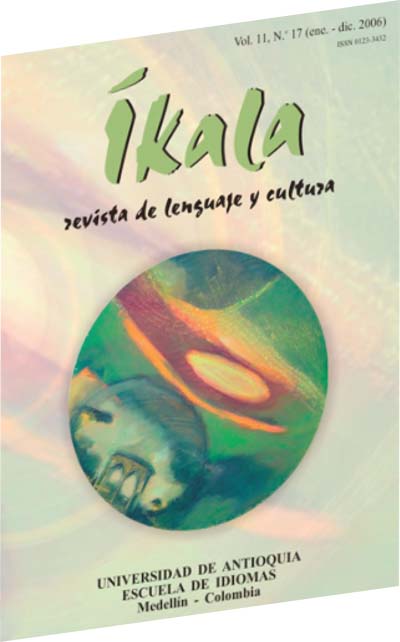*Refining Students’ Academic Writing Skills in an Undergraduate Foreign Language Teaching Program
DOI :
https://doi.org/10.17533/udea.ikala.2792Mots-clés :
le processus de l´écriture, argumenter un point de vue, interpréter une histoire, proposer une solution, appréciation, cohérence et cohésion.Résumé
Cet article présente les résultats d´une étude de recherche action dont l'objectif est d´aider les étudiants de licence en Langue Etrangère-Anglais de l'Université Surcolombiana à affiner leurs stratégies pour l'écriture d´essais de type académique. Nous avons utilisé pour cela l'écriture par processus - planification, révision, édition et appréciations réalisées par leurs camarades de classe et par le professeur-, en tenant compte aussi de l'emploi des références, le contenu, la grammaire, la cohérence et la cohésion.
Reçu: 31-03-06 / Accepté: 13-08-06
Comment citer cet article:
Zúñiga, G. & Fernando Macias, D. (2006). Refining Students’ Academic Writing Skills in an Undergraduate Foreign Language Teaching Program. Íkala. 11 (1), pp. 311 – 336.
Téléchargements
Références
Abbuhl, R., 2005, The Effect of Feedback and Instruction on Writing Quality. Legal Writing and Advanced L2 Learners [Dissertation], [Retrieved: January 26, 2006].
Allington, R., and P. Cunningham, 1996, Schools that Work, New York, Longman.
Asiri, Ibrahim, 1997, University EFL Teachers’ Written Feedback on Compositions and Students’ Reactions [Dissertation], [Retrieved: January 24, 2006].
Austin, P, 1987, The Effects of Process Instruction and Teacher Feedback on Revision of Writing Tasks by Fourth Grade Students within the Naturalistic Context of the Classroom [Dissertation], [Retrieved: January 23, 2006].
Carlini, Isolina., 1990, A Proposed System for Reducing Local Error in Student Writing [Dissertation], [Retrieved: November 19, 2005].
Connor, Ulla, 1996, Contrastive Rhetoric: Cross-Cultural Aspects of Second Language Writing, New York, Cambridge University Press.
Crystal, D, 2001, Language and the Internet, United Kingdom, Cambridge University Press. Ellis, R, 1993, “Interpretation-based grammar teaching”, System 21(1), p. 69-78.
Freedman, S, 1992, “Outside-in and outside-out: Peer response groups in two ninth-grade classes”, Research in the teaching of English, 26(1), p. 71-107.
Hedge, T, 2002, Teaching and learning in the language classroom, Oxford, Oxford University Press.
Hinkel, E, 2002, Second Language Writer’s Text: Linguistic and Rhetorical Features, Lawrence Erlbaum Associates, Incorporated.
Keith, B, 2006, A Comparison of Students’ and Teachers’ Perceptions of the Writing Process [Dissertation], [Retrieved: January 20, 2006].
Kepler, K, 2005, “Faculty Views on the Importance of Writing, the Nature of Academic Writing, and Teaching and Responding to Writing in the Disciplines”, Technical Communication, 52 (3), Washington.
Kroll, B, 1997, Second language writing: Research insights for the classroom, Cambridge, Cambridge University Press.
Light, R, 2003, “Writing and Students’ Engagement”, Peer Review, 6 (1), Washington.
McCarthy, M, 1997, Discourse Analysis for Language Teachers, Cambridge, Cambridge University Press.
Obilinovic, K, 1985, A Study on Guided Learner Self-correction and its Effects on Oral Communicative Performance [Dissertation], [Retrieved: February 2, 2006].
Onwuegbuzie, A, and Collins, K, 2001, “Writing Apprehension and Academic Procrastination among graduate students”, Perceptual and Motor Skills, 92 (2), p. 560. 331 Íkala, revista de lenguaje y cultura Vol. 11, N.º 17 (ene.-dic., 2006)
Park, T, 2004, Korean EFL Writers’ Difficulties with Sentence Cohesion and Vocabulary Use [Dissertation], [Retrieved: February 2, 2006].
Perelman, C, 2000, El Imperio Retórico. Retórica y Argumentación, Santafé de Bogotá, Grupo Editorial Norma.
Price, Sean, 2005, “The Plagiarism M Problem”, Scholastic Scope, 54 (2), New York.
Raimes, 1987, “Language Proficiency, Writing Ability and Composing Strategies: A study of ESL College Student Writers”, Language Learning, 37(3), p. 439-468. Reid, J, 1993, Teaching ESL writing, Englewood Cliffs, New Jersey, Prentice Hall Regents.
Schneider, J, 2005, “Teaching Grammar through Community Issues”, ELT Journal, 59 (4), Oxford.
Shirley, S, 2004, “The Art of Paraphrase”, Teaching English in the Two Year College, 32 (2), Urbana, IL.
Shor, I, 1987, Critical Teaching and Everyday Life, Chicago, University of Chicago Press.
Sommers, N, and L. Saltz, 2004, “The Novice as Expert: Writing the Freshman Year”, College Composition and Communication, 56(1), p. 124-26.
Topping, K, et al., 2000, “Formative Peer Assessment of Academic Writing between Postgraduate Students”, Assessment and Evaluation in Higher Education, 25 (2), p. 149.
Van den Berg, I, et al., 2006, “Peer Assessment in University Teaching: Evaluating Seven Course Designs” Assessment and Evaluation in Higher Education, 31 (1), p. 19.
Van Dijk, T, 1977, Text and Context: Explorations in the Semantics and Pragmatics of Discourse, New York, Longman.
Zamel, V, 1992, “Writing One’s Way into Reading”, TESOL Quarterly, 26 (3), p. 463-485.
Téléchargements
Publié-e
Comment citer
Numéro
Rubrique
Licence
(c) Tous droits réservés Íkala, Revista de Lenguaje y Cultura 2006

Cette œuvre est sous licence Creative Commons Attribution - Pas d'Utilisation Commerciale - Partage dans les Mêmes Conditions 4.0 International.












